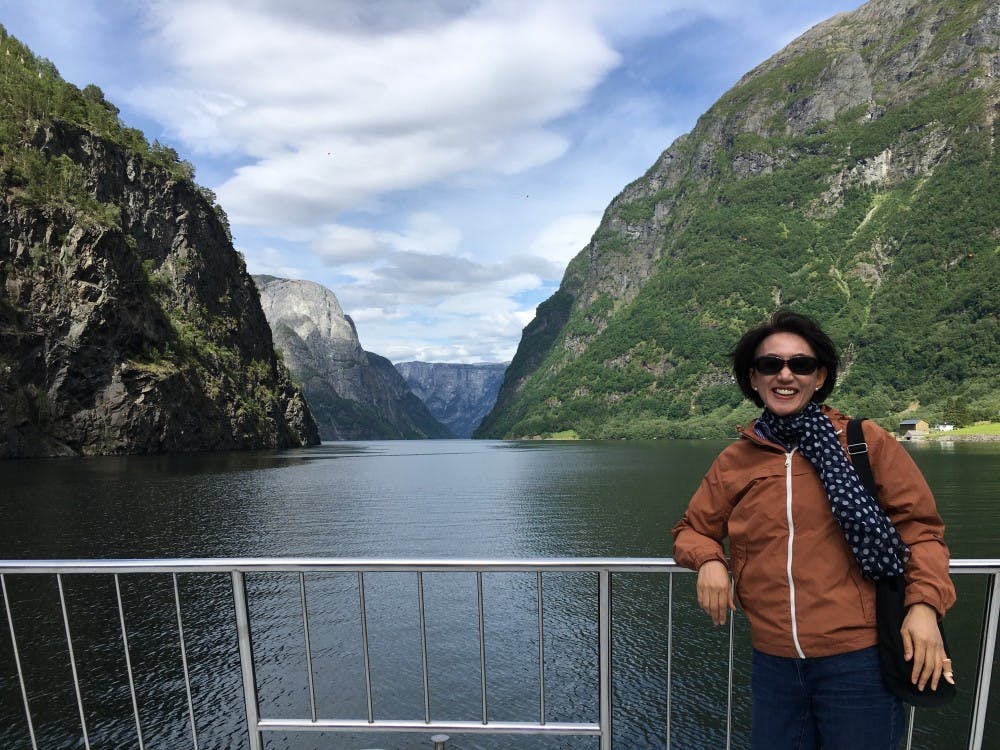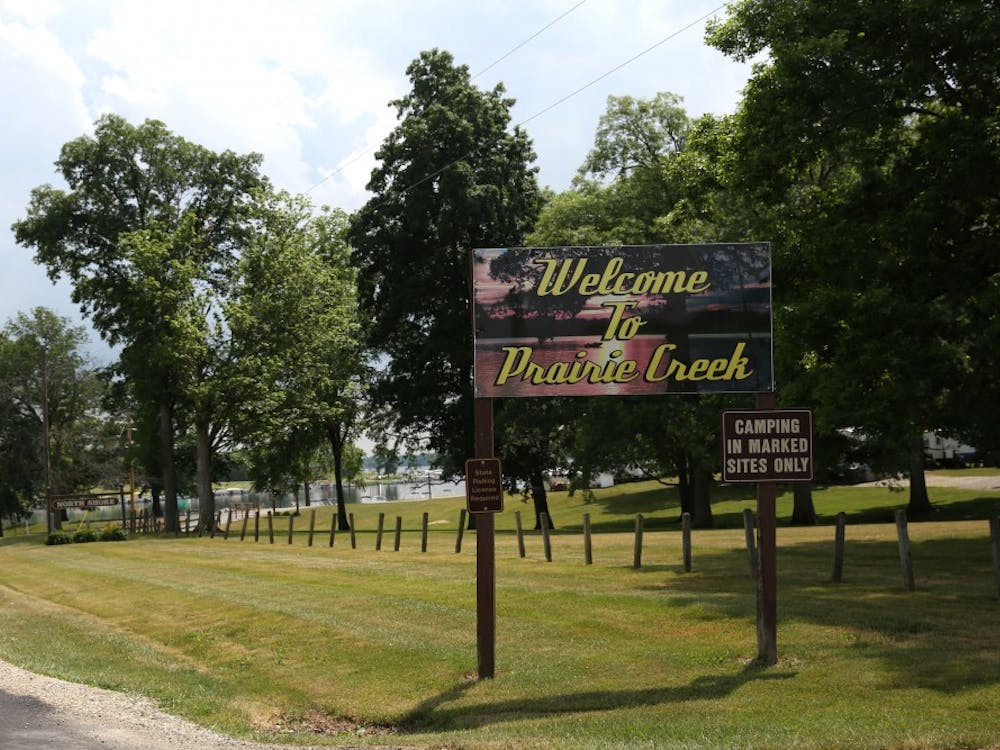Editor's Note: Where They Were Before is a Ball State Daily News series profiling various professors and their lives before teaching.
Culture is said to define a person: their beliefs, ideologies and mannerisms. Chin-Sook Pak, associate professor of Spanish at Ball State University, has had her life revolve around three cultures: Korean, American and Spanish.
Pak was born in South Korea, a culture and lifestyle that is vastly different than the one she has found in Muncie.
“My mother is a very conservative Asian woman, so I didn't grow up with books, for example,” Pak said. “My older brother had books, special lessons, but for me being a daughter it was like, ‘Oh, go outside and play.’”
Pak lived in a generation where the relationship between parent and child was completely different than it is now.
“In my generation, children did not have that much say. We just followed along with the adults,” Pak said. “So when my parents said, ‘It’s time to move to a foreign place,’ then I just thought, ‘OK.’”
When she was nine years old, her parents sat her and her two brothers down and told them they would be moving to Washington, D.C. in the United States.
“I remember my father telling me, ‘OK, we’re going to America. Just be prepared, you’re not going to be able to speak the language, but in one to two years, you will. And people may make fun of you because of your skin and how you look, OK? But don't worry about it. It’s gonna happen to you. You just adjust to school and do well,’” Pak said.
It all happened as Pak’s father had told her. Her family faced racism and prejudice the minute they arrived on U.S. soil.
“I remember it was the first week in our town house, [and] where we lived there wasn't that much diversity at all,” Pak said. “Every night we had high school neighbor kids come and throw things at our door. That happened repeatedly until dad called police and it stopped.”
Pak also experienced her first sense of culture shock, seeing the many differences between the United States and Korea.
“It was very eye-opening. I remember going to school and noticing some differences, like, I couldn’t understand why kids would do graffiti in the bathroom,” Pak said. “I knew, ‘Oh, this is a rich country,’ and a rich country in the sense that people didn’t have more things, but how people can afford to waste things.”
Other differences became clear to her as well during her three years living in the United States.
For example, in the winter growing up in Korea, Pak experienced long winter breaks, as opposed to a summer vacation in the United States, to conserve energy.
“Here in the winter, kids would be wearing just t-shirts and they take off their coat and the heating was loud and powerful, and I thought, ‘Wow, they can afford this energy,’” Pak said. “I also remember students don’t have any responsibility to take care of their school. They were paying other people to do it, whereas in Korea the students had to clean the schools.”
Pak also remembers hearing students talking back to teachers and fearing they would get expelled or suspended like in Korea. When that didn’t happen, Pak realized cultures can be vastly different and value different things.
“Looking back, it was kind of strange why other kids had made the decision already to hate us when they hadn't even met us. That didn't make sense to me then, but now it does,” Pak said. “There’s always fear, people have fear, and without the privilege of having connections, exposure to others, it's hard to come out of that fear.”
After three years in Washington, D.C., Pak’s family moved back to Korea.
Living in Korea taught Pak many life lessons and disciplines, but there was always a common theme: fear.
“It’s unfortunate, that's the tragedy of war and international politics. When you are a weak country, the dominating countries decide your fate. When it was divided ... it was divided by superpowers, and living now three generations with different ideologies, it’s really difficult,” Pak said. “We dream about reunification, but that’s more abstract thinking. So is there fear? Yes. But when you live with fear every day, it just becomes a part of your life.”
After a short year and a half, Pak’s family moved again, this time to the Canary Islands, Spain. Pak finished high school there and stayed for a total of four years.
“When I first heard English in the U.S., I thought people had marbles in their mouth. When I first heard Spanish, I thought people were fighting because of such strong consonants, and the hand gestures and the hugging, everyone being physical,” Pak said.
Living in a foreign country was not new to Pak and the adjustment came naturally.
“I was expected to adapt. Of course it was strange, but also another world that I had been introduced to. I love the food, I love the climate, I loved getting to know people,” Pak said. “Of course, I was in the middle of Korean culture too, so school life was different and home life was different and there was some conflict, but it’s like that for every group.”
For college, Pak returned to the United States and attended the College of William and Mary in Virginia, majoring in business finance.
During her senior year, Pak was invited to help teach conversation groups for Spanish students. She then realized business finance was not the major for her, and asked advisors if going to grad school for teaching Spanish was an option for her, because she was already fluent.
“When I went to college and senior year came around and I told my parents, ‘I want to go to grad school,’ my father, he’s open. My mother said, ‘Why? Come back home and get married,’” Pak said. “Even after going to school and going to college, my mother, just like two generations ago, thought you go to college and you get married to [be] a better person. That was it.”
Grad school caused Pak to examine herself on a deeper level than she expected.
“For me, having had to move so often growing up, in a way it was good, but the negative side of that was the constant struggle of identity. In a way, I felt like a gypsy,” Pak said. “So every few years I would feel like I needed to move somewhere totally new. And I think that’s one of the reasons I moved to Michigan.”
At the University of Michigan, Pak earned her doctorate in teaching.
Shortly after graduate school, in 1998, Pak would give birth to a daughter, Naari, which means “lily” in Korean.
When Naari was seven months old, Pak packed everything up and moved back to Korea to figure out her next step. Then, Pak realized there was a large need for Spanish professors in the United States, and she applied to a few colleges, including Ball State.
After seven months in Korea, Pak received and accepted a position at Ball State and arrived with hopes, dreams and a lot of reservations.
“When I came to campus, people were really warm here, and to tell you the truth, I didn’t think I would stay long in Muncie,” Pak said. “Driving on I-69 and looking at all these fields, I thought, ‘Where are people? Just cornfields and soybeans, this is the smallest place I have ever lived in my life.’ Then I came to campus and saw there wasn't that much diversity. I wasn't sure I would adjust well,” Pak said.
After nineteen years, however, Pak is still working at Ball State, leaving an impact on her students, including Jennifer Pease, a second-year graduate student studying architecture.
“Dr. Pak is incredibly driven, positive, hard working, kind-hearted and is never hesitant to share her passion of knowledge and travel with her students and those around her,” Pease said. “She is a very strong advocate for her students and always shows great patience and optimism when working with them.”
Pak loves the energy students give her, and constantly tries to give that back and encourage her students to grow in every way possible.
“When I have the privilege of getting to know a student at a deeper level, in my case with immersive learning, that gives me that opportunity, there’s this connection,” Pak said.
With one older brother living in Indianapolis and the other living in Seoul, South Korea, near her parents, Pak visits Korea about once a year.
“Growing up, home I did not know, even when I would go back to Korea,” Pak said. “Here, I finally settled. If I’m at a place where I can raise my child safely, I can afford to live, if I have work where I feel I can contribute something, if I have a small faith community with whom I can be vulnerable with, that’s home.”
Contact Justice Amick with comments at jramick@bsu.edu.





